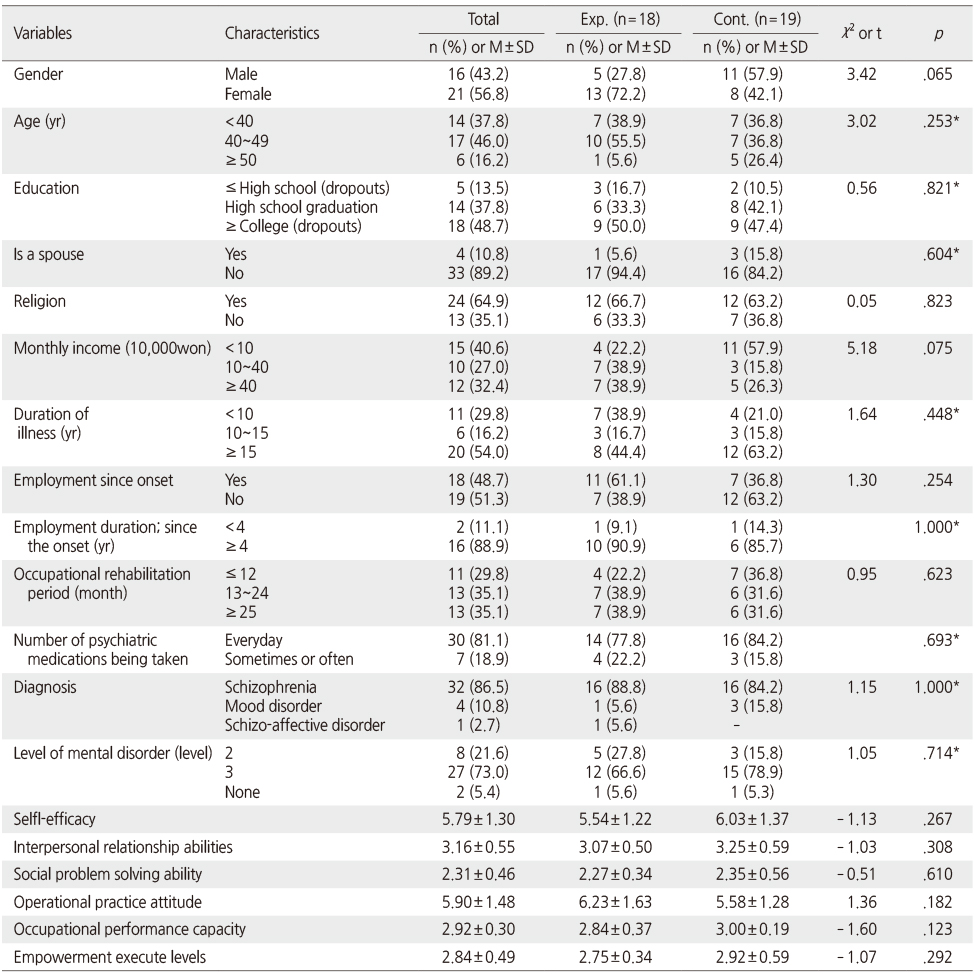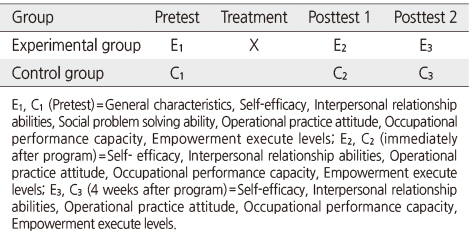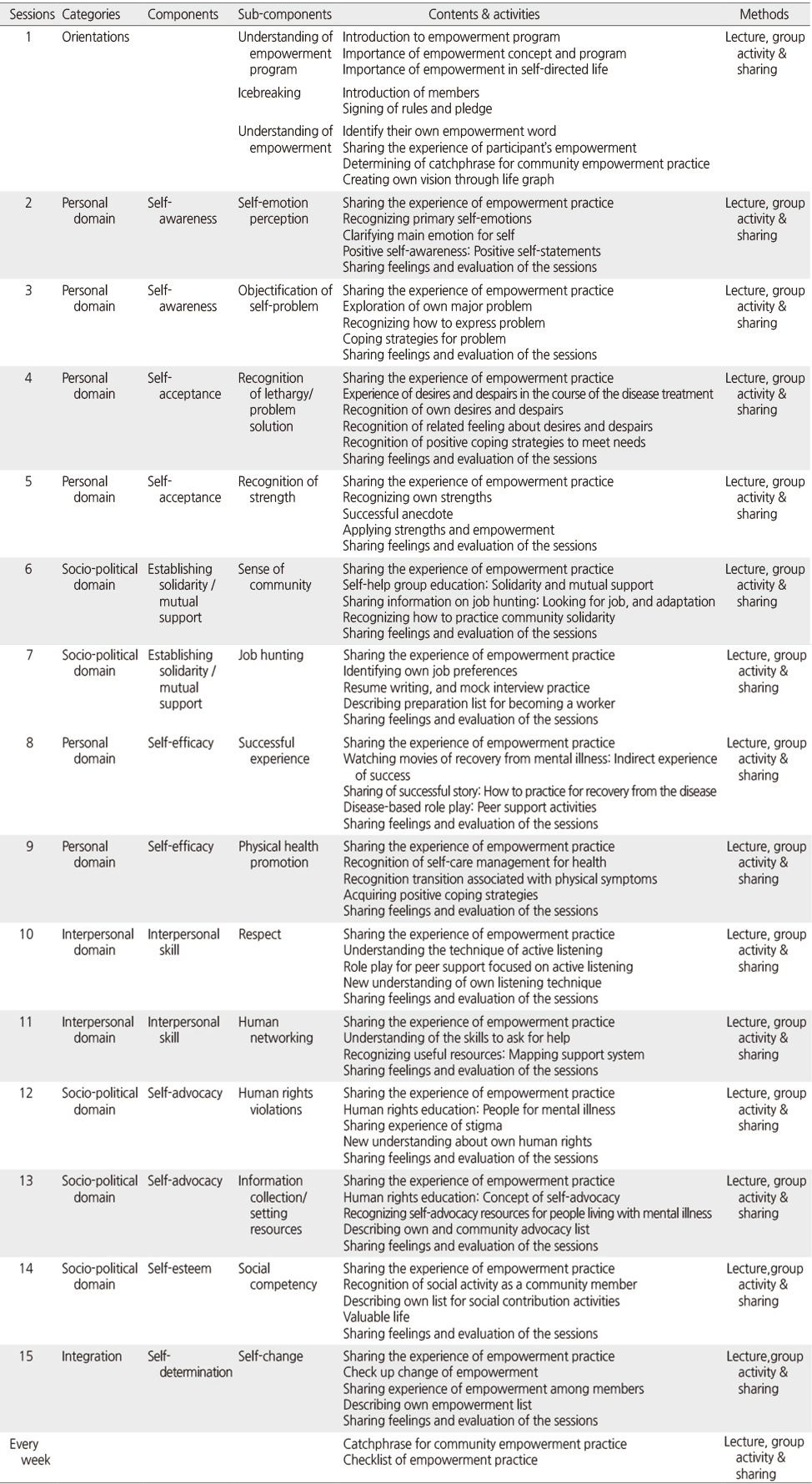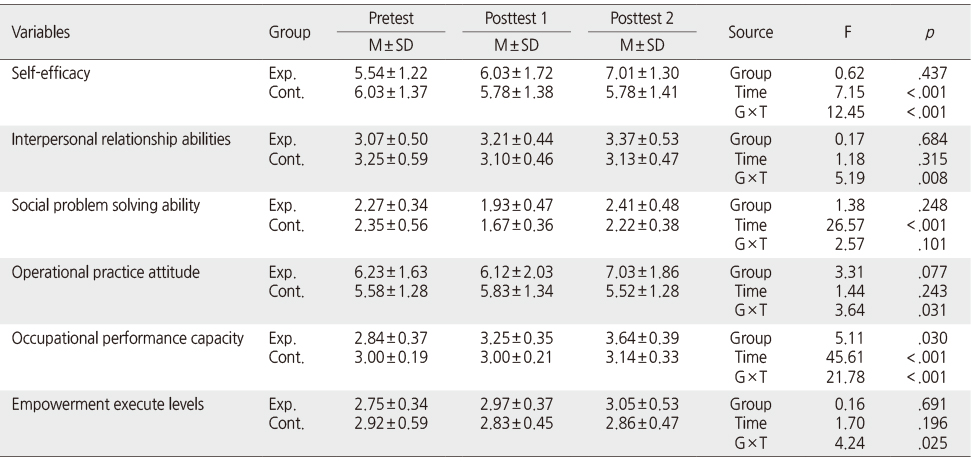Articles
- Page Path
- HOME > J Korean Acad Nurs > Volume 45(6); 2015 > Article
-
Original Article
- Development of Empowerment Program for Persons with Chronic Mental Illness and Evaluation of Impact
- Mijung Kim, Kyunghee Lee
-
Journal of Korean Academy of Nursing 2015;45(6):834-845.
DOI: https://doi.org/10.4040/jkan.2015.45.6.834
Published online: December 31, 2015
1Department of Nursing, Changwon Moonsung University, Changwon, Korea.
2College of Nursing, Keimyung University, Daegu, Korea.
- Address reprint requests to: Lee, Kyunghee. College of Nursing, Keimyung University, 1095 Dalgubeol-daero, Daegu 42601, Korea. Tel: +82-53-580-3927 Fax: +82-53-580-3916, khl645@kmu.ac.kr
© 2015 Korean Society of Nursing Science
This is an Open Access article distributed under the terms of the Creative Commons Attribution NoDerivs License. (http://creativecommons.org/licenses/by-nd/4.0/) If the original work is properly cited and retained without any modification or reproduction, it can be used and re-distributed in any format and medium.
Abstract
-
Purpose
- This study was done to develop an empowerment program for people with chronic mental illness and to analyze effects of the program on level of empowerment.
-
Methods
- The research was conducted using a nonequivalent control group pretest-posttest design. Participants were 37 people with chronic mental illness (experimental group: 18, control group: 19). The empowerment program was provided for 8 weeks (15 sessions). Data were collected between July 21 and October 17, 2014. Data were analyzed using Chi-square, Fisher's exact test, Sapiro-wilk test, and Repeated measure ANOVA with SPSS/WIN 18.0.
-
Results
- Quantitative results show that self-efficacy, interpersonal relationships, attitudes in the workplace, occupational performance capacity, and levels of empowered execute were significantly better in the experimental group compared to the control group.
-
Conclusion
- Study findings indicate that this empowerment program for persons with chronic mental illness is effective for improving self efficacy, interpersonal skills, attitudes in the workplace, occupational performance capacity, levels of empowered execute.
This manuscript is a condensed form of the first author's doctoral dissertation.
The authors declared no conflict of interest.
- 1. Employment Development Institute. 2013 disability statistics [Internet]. Seongnam, Author. 2013;cited 2014 January 13. Available from: https://edi.kead.or.kr/BoardType01.do?cmd=_view&bid=1&mid=21&idx=4579
- 2. Ministry of Health & Welfare. The 4th comprehensive policy plan for persons with disabilities: 2013-2017 [Internet]. Sejong, Author. 2013;cited 2014 November 20. Available from: http://www.mw.go.kr/front_new/policy/index.jsp?PAR_MENU_ID=06&MENU_ID=063701&PAGE=2
- 3. Kim MO, Kim HS, Lee MY. A study on empowerment process of the disabled: Focused on experience of 'pre-adulthood'. Korean J Soc Welf. 2005;57(1):31–60.
- 4. Choi YY. A study on the indepentent living of people with disabilities: Definitions and discussion. J Disabil Welf. 2005;3:123–142.
- 5. Manning S, Zibalese-Crawford M, Downey E. Colorado mental health consumer and family development project: Program evaluation. Denver, CO: University of Denver, Graduate School of Social Work; 1994.
- 6. Bronfenbrenner U. The ecology of human development: Experiments by nature and design. Cambridge, MA: Harvard University Press; 1979.
- 7. Parsons RJ. Empowerment based social work practice: A study of process and outcomes. In: The 41st Annual Program Meeting of the Council on Social Work Education; 1995 March 2–5; San Diego, CA. Council on Social Work Education.
- 8. Ko KH, Yang SH, Kim YA, Kwon MS, Bang SH, Lee JM, et al. The effects of an empowerment program for chronic schizophrenic patients on their empowerment and internalized stigma. J Korean Acad Psychiatr Ment Health Nurs. 2008;17(4):491–499.
- 9. Choi MM. Empowerment effects of the chronic mental ill's volunteer program. Korean J Soc Welf. 2004;56(3):89–112.
- 10. Park SA, Sung KM. The effects on helplessness and recovery of an empowerment program for hospitalized persons with schizophrenia. Perspect Psychiatr Care. 2013;49(2):110–117. ArticlePubMed
- 11. Schutt RK, Rogers ES. Empowerment and peer support: Structure and process of self-help in a consumer-run center for individuals with mental illness. J Community Psychol. 2009;37(6):697–710. Article
- 12. Bae KH, Kim JS. The effect of the assertiveness training program on anxiety, self-efficacy and assertive behavior of the schizophrenic patients. Clin Nurs Res. 2005;11(1):137–148.
- 13. Yongin Mental Hospital. WHO Collaborating Center. PEPS: Patient empowerment program for schizophrenia. Yongin: Author; 2006.
- 14. Faul F, Erdfelder E, Lang AG, Buchner A. G*Power 3: A flexible statistical power analysis program for the social, behavioral, and biomedical sciences. Behav Res Methods. 2007;39(2):175–191. ArticlePubMedPDF
- 15. Hofstetter CR, Sallis JF, Hovell MF. Some health dimensions of self-efficacy: Analysis of theoretical specificity. Soc Sci Med. 1990;31(9):1051–1056. ArticlePubMed
- 16. Rho ES. A study on the development of a the quality of life model of schizophrenic patients [dissertation]. Seoul, Chung Ang University. 2000.
- 17. Sherer M, Maddux JE, Mercandante B, Prentice-Dunn S, Jacobs B, Rogers RW. The self-efficacy scale: Construction & validation. Psychol Rep. 1982;51(2):663–671. ArticlePDF
- 18. Schlein A, Guerney BG. Relationship enhancement. San Francisco, CA: Josey-Bass; 1971.
- 19. Moon SM. A study on the effect of human relations training of university students. J Gyeongsang Natl Univ. 1980;19(2):195–204.
- 20. Chun SK. A study on the effectiveness of social skills training program for rehabilitation of the schizophrenic patients [dissertation]. Seoul, Soongsil University. 1995.
- 21. Maydeu-Olivares A, D'Zurilla TJ. A factor-analytic study of the social problem-solving inventory: An integration theory and data. Cogn Ther Res. 1996;20(2):115–133.ArticlePDF
- 22. Choi YS. A study of the reliability and validity of the social problem solving inventory-revised (SPSI-R). Korean J Clin Psychol. 2002;21(2):413–428.
- 23. Grand Lake Mental Health Center. Pre-vocational workshop manual. Washington, DC: Policy Studies Associates; 1995.
- 24. Hwang TY, Lee KJ. Vocational rehabilitation program for mentally disabled. Seongnam: Employment Development Institute; 2002.
- 25. Bolton B, Roessler R. Manual for the work personality profile. Fayetteville, AR: Arkansas Research and Training Center in Vocational Rehabilitation, University of Arkansas; 1986.
- 26. Son HR, Lim YR, Hwang TY. Relationship between occupational functioning and Wisconsin Card Sorting Test, symptoms in chronic schizophrenia. Korean J Clin Psychol. 2000;19(2):281–292.
- 27. Jung DJ. The study on the effectiveness of the empowerment practice perceived by people with mental disorder [master's thesis]. Seoul, The Catholic University of Korea. 2006.
- 28. Ha KH. The peer support program effect on recovery of peer provider. J Rehabil Res. 2014;18(1):31–52.
- 29. Fotoukian Z, Shahboulaghi FM, Khoshknab MF, Mohammadi E. Concept analysis of empowerment in old people with chronic diseases using a hybrid model. Asian Nurs Res (Korean Soc Nurs Sci). 2014;8(2):118–127. ArticlePubMed
- 30. Kim YY, Baek YM, Park HS. The effect of self-efficacy and problem solving capacity on rehabilitation outcomes in patients with schizophrenia. J Korean Acad Psychiatr Ment Health Nurs. 2008;17(3):322–331.ArticlePDF
REFERENCES

Figure & Data
REFERENCES
Citations

- Social Representation Study on Disabled Persons: A Longitudinal Study of Mentally Ill Patients and Verification of Differences by Type
Yeun-Joo Hur, KyuMan Han, MinKyu Rhee
STRESS.2024; 32(4): 178. CrossRef - Effects of an empowerment program for community-dwelling people with mental illness in South Korea
Myung-Sun Hyun, Hyunlye Kim, Kyoung A Nam
Perspectives in Psychiatric Care.2019; 55(1): 15. CrossRef - Effects of an Empowerment Program for Patients with Schizophrenia
Ju Hyun Woo, Ji Hye Jang, Jeong Hee Cho
Journal of Korean Academy of Psychiatric and Mental Health Nursing.2018; 27(2): 123. CrossRef

Fig. 1
Empowerment Program Development for People Living with Chronic Mental Illness
Homogeneity Test of Characteristics and Dependent Variables between Experimental and Control Group (N =37)
*Fisher's exact test; Exp.=Experimental group; Cont.=Control group.
Effect of Empowerment Program on Self-Efficacy, Interpersonal Relationship Abilities, Social Problem Solving Ability, Operational Practice Attitude, Occupational Performance Capacity, and Empowerment Execute Levels (N =37)
Exp.=Experimental group (n=18); Cont.=Control group (n=19); GxT=Group×Time.
*Fisher's exact test; Exp.=Experimental group; Cont.=Control group.
Exp.=Experimental group (n=18); Cont.=Control group (n=19); GxT=Group×Time.
 KSNS
KSNS
 E-SUBMISSION
E-SUBMISSION



 Cite
Cite

